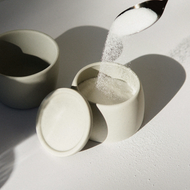The Sugar Trap—The Surprising Impact & How To Reduce Your Sugar Intake
Posted by Melanie Francis on 4th Nov 2024
Sugar, a seemingly innocuous ingredient found in many of our beloved treats and beverages, harbors a deceptive nature. Disguised within the sweet flavors that tantalize our taste buds, sugar can silently wreak havoc on our health. While indulging in moderate amounts of sugary delights can be pleasurable, the unbridled consumption of sugar triggers a cascade of adverse consequences that can undermine our well-being.
Consider the impact of excessive sugar intake on our bodies. It initiates a vicious cycle where the body craves more and more sugary substances, leading to an addiction-like behavior. This overconsumption can result in weight gain, as sugar provides empty calories devoid of essential nutrients. The excess sugar is converted into fat, contributing to obesity, a significant risk factor for chronic diseases such as heart disease, stroke, type 2 diabetes, and certain types of cancer.
Moreover, sugar has a profound effect on our oral health. It feeds the harmful bacteria in our mouths, promoting tooth decay and gum disease. The acidic environment created by sugar erodes tooth enamel, making our teeth more susceptible to cavities. The consequences extend beyond physical health. Sugar consumption has been linked to mental health issues, including anxiety, depression, and cognitive decline. Studies have shown that high sugar intake can impair brain function, interfering with memory, learning, and decision-making abilities.
To safeguard our health, it is imperative to curb our sugar consumption. This doesn't mean eliminating all sweets from our lives but rather making conscious choices to limit added sugars. Opting for natural sources of sweetness, such as fruits, provides us with essential vitamins, minerals, and fiber. Mindful eating practices, like paying attention to portion sizes and frequency of sugary indulgences, can help us maintain a balanced diet.
By becoming aware of the hidden dangers of sugar and taking proactive measures to reduce our intake, we can empower ourselves to make healthier choices. Every small step toward reducing sugar consumption contributes to a significant improvement in our overall well-being.
The Health Risks of Overindulging in Sugar
Consuming too much sugar can lead to a variety of negative health effects, including:
- Weight Gain: High sugar intake can contribute to obesity, as sugary foods and drinks are often high in calories and low in nutritional value.
- Increased Risk of Type 2 Diabetes: Excessive sugar consumption can lead to insulin resistance, increasing the risk of developing type 2 diabetes.
- Heart Disease: High sugar diets have been linked to a greater risk of heart disease, as they can increase blood pressure, inflammation, and triglyceride levels.
- Dental Problems: Sugar is a major contributor to tooth decay and cavities, as it feeds the bacteria in the mouth that produce acid, eroding tooth enamel.
- Fatty Liver Disease: Excessive fructose (often found in sugary drinks) can lead to non-alcoholic fatty liver disease, as the liver metabolizes it into fat.
- Mood Swings and Mental Health Issues: High sugar intake can lead to mood fluctuations, increased anxiety, and may even be linked to depression.
- Skin Aging: Diets high in sugar can accelerate the aging process of the skin due to a process called glycation, which affects collagen and elastin.
- Increased Risk of Certain Cancers: Some studies suggest a link between high sugar consumption and an increased risk of certain types of cancer.
- Nutritional Deficiencies: High-sugar diets often lack essential nutrients, leading to deficiencies that can affect overall health.
- Addictive Behavior: Sugar can trigger reward centers in the brain, leading to cravings and potential dependency similar to addictive substances.
Limiting sugar intake and opting for healthier alternatives can help mitigate these risks and promote overall well-being.
Breaking Free from the Sugar Shackles: Tips for Reducing Intake
Reducing sugar intake doesn't mean sacrificing all sweetness. Here are some practical tips to help you curb your sugar cravings:
- Read Food Labels: Pay close attention to the sugar content listed on food labels. Be aware of hidden sugars in processed foods.
- Choose Whole Foods: Opt for whole, unprocessed foods like fruits, vegetables, and whole grains, which are naturally lower in sugar.
- Cook at Home: Preparing meals at home allows you to control the amount of sugar added.
- Limit Sugary Drinks: Sugary drinks are a major source of added sugar. Choose water, unsweetened tea, or infused water instead.
- Find Healthy Swaps: Replace sugary snacks with healthier alternatives like fruits, nuts, or yogurt.
- Use Natural Sweeteners: If you need to sweeten foods or beverages, consider using natural sweeteners like stevia.
Making these small changes can help you significantly reduce your sugar intake over time and improve your overall health.
Sweetness Without Feeling Deprived: Embracing Sugar-Free Alternatives
Sugar-free alternatives can be a valuable tool in your journey to reduce sugar intake. Products like 5 Sparrows Brand Stevia Sweetened Creamers and Drink Mixes offer a guilt-free way to enjoy sweetness without the negative health effects of sugar.
The Benefits of 5 Sparrows Brand Products
- Zero Sugar: These products are sweetened with stevia, a natural, zero-calorie sweetener.
- Delicious Flavors: 5 Sparrows offers a variety of delicious flavors to satisfy your sweet tooth.
- Versatility: Use the creamers in your coffee or tea, and enjoy the drink mixes as a refreshing beverage.
- Healthy Lifestyle Support: By choosing sugar-free alternatives, you can support your health goals while still enjoying a sweet indulgence.
A Sweet and Healthy Balance
Remember, moderation is key. By making informed choices and incorporating sugar-free alternatives like 5 Sparrows Brand products, you can navigate a path towards a healthier lifestyle without sacrificing the joy of sweetness.

